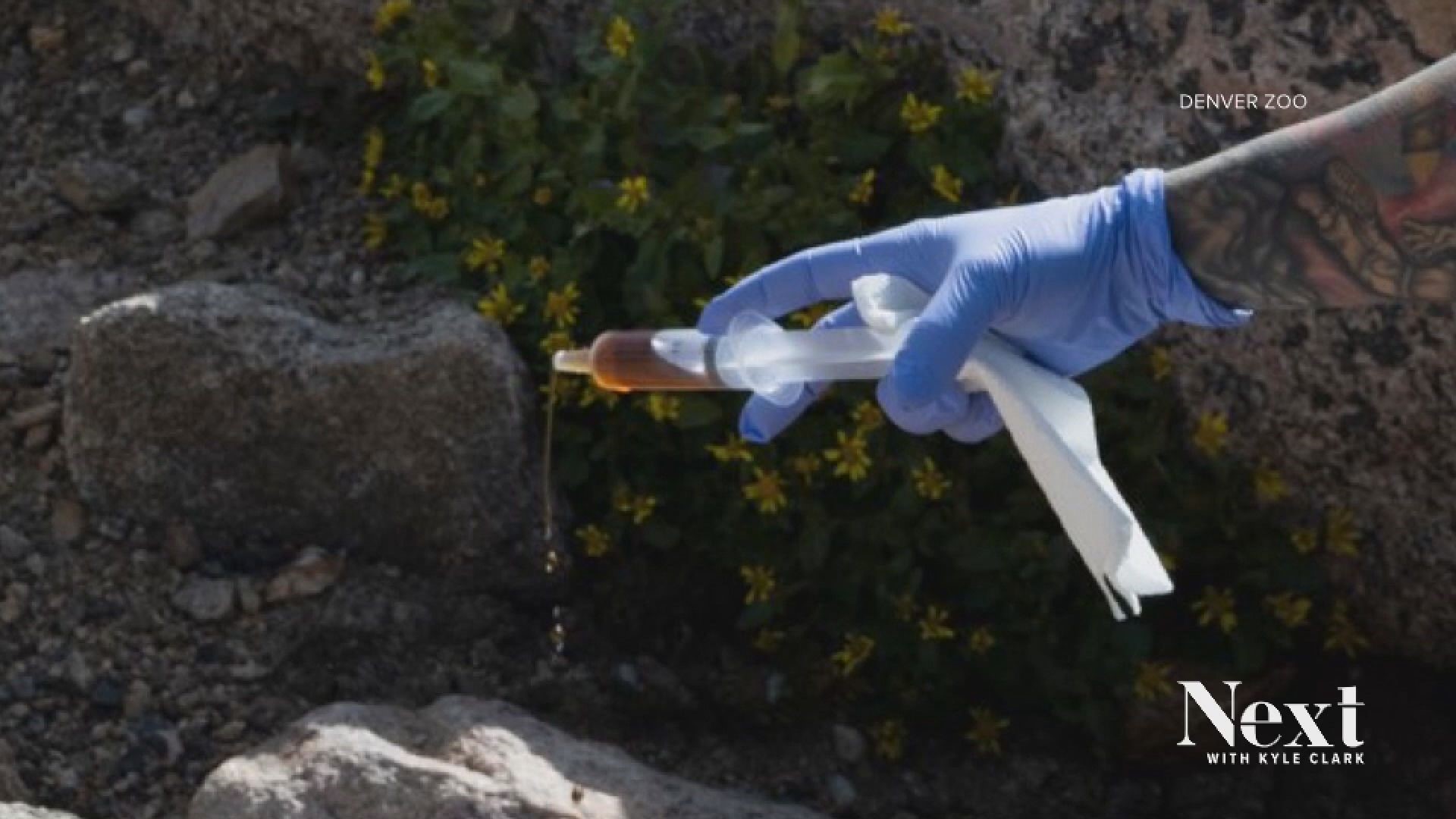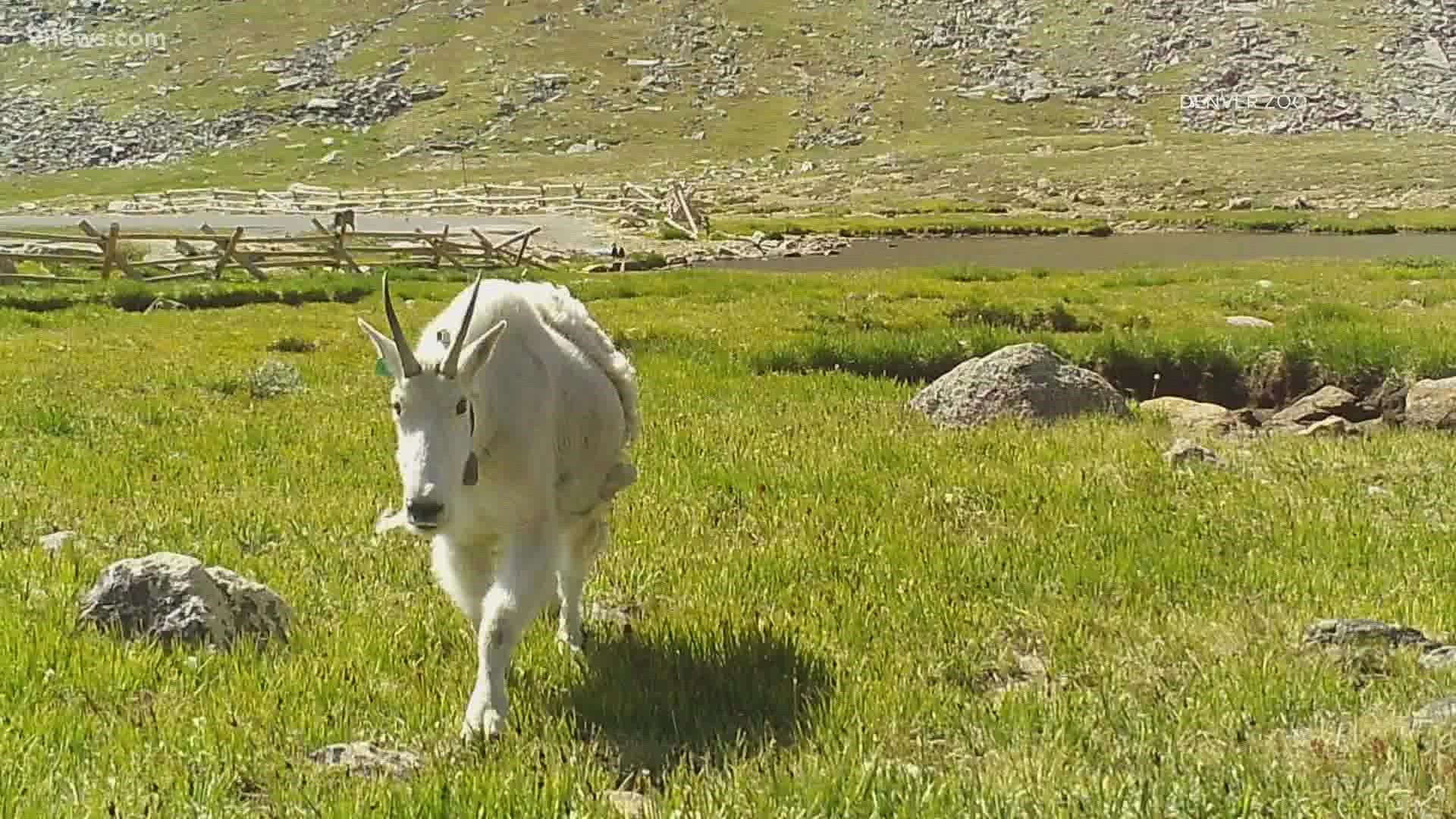DENVER — Building trust with bighorn sheep takes time.
"We typically don't want to approach wildlife, but when you can in a safe situation, it's always a joy," Jess Harrington said.
The alpine field technician with the Denver Zoo sat inside the bighorn sheep enclosure with her hand full of grain pellets, doing her best to attract the attention of Rita and Lucy.
"I’m actually trying to get one of the bighorn sheep to eat out of my hands," she said.
Initially, Rita seemed the most hesitant of the bighorn sheep, but she was the one who gave in on Wednesday afternoon. She took a little nibble of pellets from Harrington's palm.
"Success!" Harrington exclaimed. “That was pretty awesome. That’s like the highlight of my, at least, month.”
Harrington fed the animal from her hand because she wanted to learn more about the texture and feeling of a bighorn sheep tongue. She wants to do the same with a mountain goat so researchers at the Denver Zoo can create replica tongues.
Seriously.
“We’re trying to employ this experiment where we take silicone tongues, spray it with distilled water, and then run it up a surface and then test for salt on those tongues to see if you get more per lick on a smooth surface than a rough surface," Harrington said.
Harrington hopes to do that experiment next summer. This summer, she's been far too busy with mountain lion urine.
“Honestly, when I first started, I was like, 'mountain lion urine?'" Harrington laughed. "Like, that’s kind of weird.”
What initially seemed strange made much more sense at the end of the long, winding road that stretches to the top of Mount Evans.
Harrington joined researchers with the Denver Zoo at the peak of the mountain to learn about the source of the salt that bighorn sheep and mountain goats love to lick. Their research is funded in part by the National Geographic Society.
“There’s a lot of potential salt sources," Stefan Ekernas, a conservation biologist at the Denver Zoo, said. "It can be from road infrastructure. It can be from building infrastructure. It can be from gravel. It can be on cars, and it can be from people feeding wildlife."
Salt attracts wildlife to the parking lots on top of Mount Evans and draws them closer to people. Ekernas said bighorn sheep are susceptible to pneumonia, and there's concern the infection could spread more easily if salt in the parking lots keeps enticing animals.
“We’re potentially creating super-spreader events when we have animals coming in and congregating in these parking lots," Ekernas said. "That’s what we’re trying to solve.”
The potential solution could be pee.
“One of our keepers is working up [on Mount Evans], and she came up with a great idea to say, ‘Hey, why don’t we put mountain lion urine in the parking lot so that animals will perceive this to be a dangerous place and then won’t try to go there?'" Ekernas said.
It was worth a shot, or at least a bucket of mountain lion urine.
“It turns out that mountain lion urine is commercially available," Ekernas said.
The Denver Zoo placed an order, and Harrington helped get gallons of urine up the highest paved road in North America.
“Our conservation vehicle smelled like urine for probably about a week or two after we transported up there," she said.
Harrington and the researchers walked the perimeter of the parking lots with jugs of urine and poured a small amount every 10 feet. They set up motion-activated cameras so they could capture the reaction of wildlife.
“We’re hoping that bringing that scent of the mountain lion urine up to where they’re at in the summer, it’ll stimulate that survival response, or that survival mechanism, and keep them away from those areas," Harrington said.
The researchers are also doing behavioral experiments and observations to see how goats and sheep react when mountain lion urine is poured in front of them.
“At the end of the day, we want to try to get animals out of the parking lot," Ekernas said.
It'll take some time to figure out if the predator's pee actually keeps other wildlife away.
“It’s been really great to work with keepers who have these out-of-the-box ideas and that might actually work," said Ekernas.
If it works, a researcher's career may reach its peak.
Editor's note: A previous version of this story shared a quote from Ekernas who said the urine was purchased from Amazon. The zoo updated us to say he misspoke, and they purchased the urine on thepeemart.com.
WATCH: Will mountain lion urine attract mountain lions?
SUGGESTED VIDEOS: Animals and Wildlife


